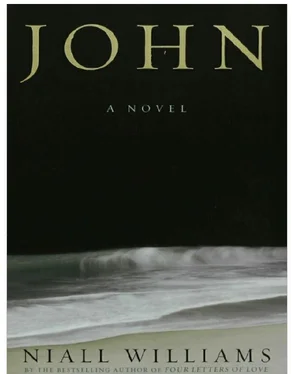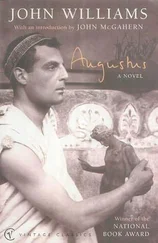'Tell me of the sky,' the Apostle says.
'The sky, Master?'
'Yes. Tell me.'
'There is cloud. White cloud. Moving slowly. And some blue in the east. Pale. Very pale.' Papias does not know what else to add, whether there is something of significance he misses. The old man says nothing. He sits, face angled to the light, silent.
Is it this sky or another in memory he sees? Papias wonders. In his blindness does he remake the world as it was once? Where does he go in the long silence of the days here on the island? Papias is too young to have known him in his vigour. The Apostle was already blind when the youth sailed to Patmos, and so he has not seen the strong figure of the fisherman, the muscled, brown-haired figure who in his own youth had walked into Jerusalem by the side of Jesus Christ. But he has heard a thousand stories. Boanerges, Jesus had called the sons of Zebedee, Sons of Thunder, for their temper and strength. Papias had heard of them in preachings from wandering Christians who came in from the desert lands beyond Antioch. He had heard of the twelve, the followers of the Galilean, and how one was little more than a youth; this one loomed in Papias's mind. To be of that age and see the Christ, what would it have meant? Would Papias himself have known? Would he, too, have abandoned his family, the fishing business, to follow? He had listened to the preachings carefully, the stories they told beneath a held awning on sticks, of the signs at Cana, the healing of the royal official's son, and come back the following day to hear more. In dazzling sunlight he sat cross-legged and heard from the blistered lips of the Christians' accounts, grossly detailed, of the scourging of Jesus. Blood spatter, lacerations, spearings, stones thrown, all were vividly painted. Thin arms out-spanned, head thrown back, one with ragged twist of dusty beard and eyes baleful and prominent, made alive the agony of the crucifixion, the nails driven, the pulp of hand bursting, the raw torment when the cross was risen up and the Christ hung.
And these things the youth John witnessed, Papias had thought. When he lay in the cool of the night after, images of the preaching took possession of his mind. For the three days the Christians remained he went to listen. He heard the glory of the resurrection told — John running first to the tomb but waiting at the entrance, as if he did not need to see to believe. The Christians told it like a triumph, though the flies sheltered beneath the canopy and crawled on their faces, though some passing called out at them to be gone, or derided their telling with pulled faces and mocking gesture.
'What of John after?' Papias had asked the skeletal Christian.
'What of the Son of Thunder?'
'To John was given the care of the Lord's mother, Mary. And he was attentive to this until she rose to heaven in glory. Then he travelled in his ministry, as do we, telling the good news. And for this he was imprisoned and stoned and flogged, but escaped and continued. He passed through lands as many as stars, through Phrygia and the country of Galatia, Mysia, Bithynia, through Pisidia into Pamphylia, was in Thyatira and Amphipolis, Thessalonica, saw fifty men crucified on the road out of Sepphoris.'
The Christian, warming to his topic, continued, the naming of places a kind of conquering.
The boy Papias had sat, mesmerised. It was the best story he had ever heard. In it he believed utterly. When the Christians left, ragged caravan of a donkey with pots and water bags, mat rolls, rattle and hum of murmured prayer, Papias missed the theatre of their conviction, the quality they bore of being touched. He watched for others, pricked his ears when stories circulated of Christians driven out, of crucifixions, stonings, of how they were beggars and would steal even the mat you sat on. When others came, as they did — now three thin and wizened near ghosts, one, whose face was bubbled with leprosy, now a sprawling family, men, women, a blind child — he went and listened.
'What of John, the youth?' he always asked, 'who sat at the right hand of Jesus?'
And so, frayed patchwork of Christ's history was his. From numerous tellings, expansive, exaggerate, or spare, Papias learned the life story of the Saviour, but more, assembled, too, the image of the fearless beloved disciple.
'Where is he now?' he would ask. 'Where is John, the youth?'
He was now an Ancient, he was told. One said he was imprisoned in a pit in Rome, to be fed to the lions, but the Lord God came in a chariot of light and saved him and slew all that attended. He had gone into the east another recounted, into strange far lands on the furthermost edge of the earth to preach the resurrection. He had cured a thousand, it was told, made see the blind. He had plucked a spear from his side and tossed it from him as a dove that flew into the heavens. He walked the world entire as living witness and could not be killed, the Christians said. Ten thousand miles were in his feet, dust of all creation.
One, Nuri, a rag of man, sag-fleshed, slit-eyed, said he himself had touched the Apostle's robe. He held a bone of arm towards Papias, outstretched claw of fingers, in invitation for the youth to leave his life and join them. Beneath the pulsing heat, blue canopy of sky and scorched light, Papias had considered them: the smallest of tribes, their two goats, their road-worn apparel a badge of their poverty, the watery pink of zeal in their eyes. He had read more books than all of them, had clean robes and a room of his own next to his parents, whose love he had as an only child. The claw wavered in the sunlight.
'Come with us,' Nuri said, hacking the words like pits from the thin gully of his throat. 'Come and follow the Lord.'
The others, who sat to listen or stood about momentarily to eye the curiosities, looked then at Papias as at a spectacle. He felt their eyes upon him, the sudden ringing in his ears as though his head was inside a bell. He had not expected it. Nuri was a shrunken and unseemly messenger if from God. His skull was reclaiming his face. His lips, part eaten by some long-ago disease, were dried crusts, quivering now as he waited for the answer.
'He has called you. Will you come and follow the Lord?' he asked a last time.
In the distance of the village a donkey brayed. The spell broke, and Papias shook his head and walked hotly away. There were jeers at the Christians and jokes in the aftermath of intensity. In the evening they were gone, empty circle of printed ground when Papias returned to it the following day, in its centre, stick-drawn, the sign of the fish.
For a time then he kept himself from others who passed that way.
But always there was a prompting. In night visions he would see the Christians flogged, the crucifixions rising one after the other along the roads of his dreams. He saw the outstretched hand hanging in air before him, and sometimes the white-clothed figure of the Christ himself, pacing away over desert sands toward immutable destiny. But these yet did not sway him. He awaited a sign, and believed he was sent it when one day two years later he heard that the apostle John, himself, the Son of Thunder, was banished in exile on the island of Patmos.
Papias sailed there and was baptised, and because of his youth and devotion, became the attendant of the Apostle.
These things he thinks now as he sits by John at the entrance of the cave and tells of the sky. His is to serve the Master, he tells himself, and in doing so serves best the Lord.
But as he sits and the clouds move swiftly across the blue, Papias also thinks of the two children he has buried beneath the stones, and the woman Marina who believes she is a harbour for demons and death.
'Master, it is Prochorus. He is ill with fever. The side of his face is imprinted with blister.'
Читать дальше










